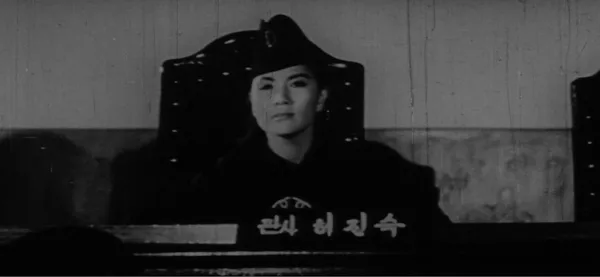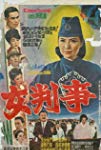Eye For Film >> Movies >> A Woman Judge (1962) Film Review
A Woman Judge
Reviewed by: Jennie Kermode

How can a woman be a good and dutiful wife when she also has a career? It's simple, argues the heroine of this 1962 Korean drama. She'll just work extra hard.
Society was changing rapidly during this period but was still a long way from believing in equality between the sexes. Whilst in its time A Woman Judge was a challenging and influential film - hence its inclusion in this historical strand at the 2019 London Korean Film Festival - today it's interesting in large part because of the way it highlights the conceptual gaps in early feminist challenges to Confucian ideas about gender. It also explores the difficulties faced by its ambitious yet dutiful central character and the way that the feminist struggle is not a simple case of women taking on a male establishment but often sees them undermined by other women with their own forms of investment in the status quo.
Jin-suk (Moon Jeong-suk) is studious by nature and abruptly puts an end to her relationship with her childhood sweetheart when he asks her to choose between him and working as a judge. She has the support of her adoring father and of another older man, who is so impressed by her spirit that he arranges for her to marry his son Gyu-sik (Kim Seok-hun) and thereby improve the reputation of his family. Gyu-sik, however, is uncomfortable about Jin-suk's rapidly developing celebrity status and becomes sulky when she doesn't have time to pay him the attention he craves, with predictable consequences. there's a hint of smart politics to this. By conceding that such relationships will come under pressure (at least in the absence of men who feel able to do housework or entertain themselves at home), writer Shik Chu anticipates a cynical response to the then unusual set-up and shifts the focus onto the importance that Jin-suk's work has in its own right.
Whilst navigating this difficult relationship and the challenges of her job, in which the empathy expected of women proves to be a useful asset, Jin-suk is repeatedly undermined by a trio of women. Her mother (Hwang Jung-seun) wants the best for her but engages in a form of subtle gaslighting, convinced that no woman can really be happy except as a stay-at-home wife. Her mother-in-law treats her as a childish ingrate. And her spoiled sister-in-law takes that "you think you're too good for us" attitude routinely used, even today, to try and cut down any woman with a modicum of ambition. Together they chip away at Jin-suk's confidence until, with a dramatic twist in the third act, the film shifts into very different territory which inspires her to remember the principles that attracted her to law in the first place.
This film was inspired by the real life murder of a female judge in Korea, and uses its sudden high-stakes plotline to explore additional issues around the status of women and the sacrifices frequently expected of them, broadening out its feminist message to explore the ways in which change has the potential to benefit every member of society. The structure leaves it feeling a bit unbalanced but is perhaps a result of director Hong Eun-won, who had hitherto worked as a scriptwriter under more than one censorious regime, knitting together very conventional dramatic elements so as to minimise the number of grounds on which her film could get in trouble. This may also account for the highly sentimental nature of much of the story (though there continues to be a sentimental streak in popular Korean cinema, not always obvious from the films that reach international audiences). Nevertheless, this is an important and ambitious piece of work which serves as a fascinating guide to the way social mores were changing during the period.
Reviewed on: 17 Oct 2019

















